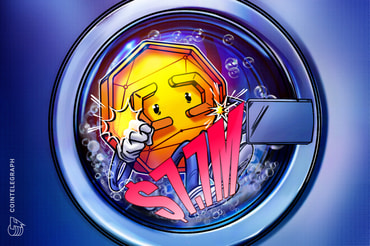Protocol Village: Worldcoin, Sam Altman-Backed Crypto Project Known for Iris-Scanning Orbs, Turns to ‘1:1 Face Comparison’

Election 2024 coverage presented by
Worldcoin, the blockchain identity network known for its iris-scanning orbs as well as its affiliation with OpenAI founder Sam Altman, introduced Face Auth, a new security measure for World ID. According to the team: “Face Auth is a private 1:1 face comparison that ensures only the person who verified their World ID at an orb can use it. It provides increased security for your World ID during actions like online purchases, financial transactions, secure sign-in applications and much more.”
The Polkadot community released its latest major product, Agile Coretime, as part of the ongoing Polkadot 2.0 upgrade. According to the team: “This new feature represents a significant advancement in how computational resources are allocated and managed within the Polkadot ecosystem… This new approach replaces the previous auction system, in which single cores were leased for two years at a time.” Accoding to the project documentation: “Agile Coretime allows for the purchase of coretime in ‘bulk,’ with an allocation for one month. Heavy duty parachains which need to author a block every 12 seconds (or every six seconds through Asynchronous Backing), can seamlessly ‘renew’ the core each month. Coretime renewal orders take precedence over new orders and provide protection against price fluctuations, allowing parachains to plan their project budget and costs more effectively. The purchased coretime can also be split up and sold in parts, down to a single block per month, allowing for secondary markets to thrive and improve the allocation efficiency of coretime.”
Core usage before, with Polkadot 1.0:
After, with Polkadot 2.0 and Agile Coretime:
Privado ID, formerly Polygon ID, which has established proofs-of-concept with several multinational banking and financial service companies, announced a strategic merger with Disco, a pioneer in multichain verifiable data and reputation management. According to the team: “The merger will propel the development and adoption of a unified, chain-agnostic digital identity infrastructure spanning both Web2 and Web3 ecosystems, and for the first time see Privado ID become available in chains like Optimism, Arbitrum, Base and others with Privado ID’s own established partnerships and scalable infrastructure.” The press release stated: “By leveraging Disco’s Decentralized Identifiers (DIDs) and Verifiable Credentials (VCs), Privado ID enhances cross-chain compatibility enabling it to expand its services across multiple EVM-compatible chains.”
Midnight Network, a new layer-1 data protection blockchain, has released its litepaper, “Nightpaper.” The paper aims to “demonstrate how the network enables apps that protect user, commercial and transaction metadata. The Nightpaper explains how Midnight has solved a new blockchain trilemma: using zero-knowledge (ZK) proofs for utility without compromising data protection or ownership.”
Solana Labs’s phone designing subsidiary is slated to ship its second crypto phone in 2025, Solana Mobile announced at the Token 2049 conference on Thursday. Called Seeker, the upcoming handheld will be a major hardware improvement over Solana’s first mobile phone, with better battery, a stronger camera and a lighter design than the Saga, said Emmet Hollyer, who runs Solana Labs’ phonemaking project. CoinDesk 20 asset: (SOL)
Civic, developer of a tokenized identity solution on the verifiable web, has partnered with Rentality, described as the first Web3 car rental platform, “to securely verify drivers’ licenses and enforce age minimums on the Base network.” According to the team: “Using Civic’s ID Verification Pass, users can verify licenses virtually, streamlining the car rental process. This solution enhances security, trust and compliance in car rentals and peer-to-peer marketplaces by eliminating the need for physical verification and reducing friction in the transaction, setting a new standard for secure rentals.”
Chromia, a blockchain ecosystem that aims to avoid network congestion partly by giving every decentralized app (dapp) its own cluster of nodes and computational resources, announced the upcoming “Asgard” mainnet upgrade on the TOKEN2049 stage, along with a $20 million Data and AI Ecosystem Fund. According to the team: “The fund is aimed at supporting data-intensive projects and AI-enabled applications. Asgard, scheduled for Q4 2024, will introduce ‘Extensions’ – customized chains designed to bring new functionalities to the platform such as oracles, computation for AI models, support for data availability and ZK proofs.”
Jade City, a RWA platform specifically designed for tokenization of the $50 billion-plus jade market, released its white paper. According to the team: “The Jade City white paper outlines how the new platform will kick off a new era of RWA tokenization when it launches later in 2024, detailing its supply and value chain, supply and distribution partners, revenue and token model, and ongoing roadmap.” According to the white paper: “The economy of Jade City is powered by a community-funded value chain. The Jade City community gains access to raw material by purchasing a treasury bond with a stablecoin such as USDT. These funds are used to acquire jade early in the value chain. In return, part of the profit generated from processing and sales is given back to bond holders in the form of tokenized physical jade. The majority of the remaining profit is used to buy. and burn the $JCT token, channeling value to the token holders.” The project was co-founded by the owners of the largest jade deposit, the paper reads. According to a spokesperson, the project is being built on Base, with a beta platform expected in early October.
ChainOpera AI, a decentralized and open AI platform, has emerged from stealth, according to the team. The project is “launching its decentralized platform and app marketplace that enables developers to build, train, and deploy AI applications using fully decentralized resources. While existing decentralized AI solutions focus on infrastructure like GPUs, they still rely on centralized providers like AWS. ChainOpera fills this gap by delivering enterprise-grade AI models and decentralized infrastructure, providing cost-effective GPU access, community-sourced AI training, and a marketplace for apps built on its decentralized infrastructure.”
Oasis Network, designed to be a scalable, privacy-first and versatile layer-1 blockchain, has launched liquid staking in partnership with Accumulated Finance, according to the team: “ROSE token holders can now stake their assets while keeping them liquid for trading or use in DeFi applications. This new feature, powered by the Oasis Sapphire ecosystem, provides stROSE, a liquid staking token, allowing users to earn rewards and engage with decentralized apps. Improvements include boosted staking APR and a reduced unbonding period.” Users no longer have a 14-day unbonding period when converting staked ROSE to unstaked ROSE, a blog post reads.
MatrixPort, a digital asset services platform, and exSat, a docking layer for Bitcoin scalability, plan to work together to introduce nBTC, a wrapped bitcoin alternative, “to improve liquidity and enable diverse financial applications such as staking and lending,” according to the team: MatrixPort “will leverage its technology and user base, while exSat focuses on indexing UTXO data. The strategic partnership is set to position exSat as the biggest among Bitcoin L2s, with ~$400 million at launch.”
RedStone, a leading provider of blockchain oracles, announced the integration of its data feeds into the TON (The Open Network) blockchain. According to the team: “This integration empowers developers and users with fast, gas-efficient and secure data solutions. It is the first and only oracle solution to offer price feeds for TON. By continually expanding its data feeds to meet the evolving demands of the TON ecosystem and deploying production infrastructure to support high-demand asset prices, RedStone is dedicated to fostering the continued growth of TON’s DeFi landscape.”
Aethir and GameCentric announced a collaboration to enhance Web3 gaming using Aethir’s decentralized GPU cloud infrastructure. According to the team: “This integration boosts GameCentric’s scalability, security, and performance, supporting its expansion into in-game tokens, non-custodial wallets, and a marketplace. This collaboration enables GameCentric to lead in emerging markets while elevating player experiences across Web2 and Web3.”
Decentralized finance (DeFi) platform Drift raised $25 million in Series B funding to expand its Solana-based exchange, Fortune reported on Thursday. The round was led by led by Multicoin Capital. Drift plans to build an array of financial services tools, including spot and derivatives trading and a predictions market to become the “Robinhood of crypto,” co-founder Cindy Leow said, according to the report. The company intends to double its headcount to 50 within the next year.
Protocol Village is a regular feature of The Protocol, our weekly newsletter exploring the tech behind crypto, one block at a time. Sign up here to get it in your inbox every Wednesday. Project teams can submit updates here. For previous versions of Protocol Village, please go here.
Edited by Bradley Keoun.
Disclosure
Please note that our privacy policy, terms of use, cookies, and do not sell my personal information has been updated.CoinDesk is an award-winning media outlet that covers the cryptocurrency industry. Its journalists abide by a strict set of editorial policies. In November 2023, CoinDesk was acquired by the Bullish group, owner of Bullish, a regulated, digital assets exchange. The Bullish group is majority-owned by Block.one; both companies have interests in a variety of blockchain and digital asset businesses and significant holdings of digital assets, including bitcoin. CoinDesk operates as an independent subsidiary with an editorial committee to protect journalistic independence. CoinDesk employees, including journalists, may receive options in the Bullish group as part of their compensation.
Bradley Keoun is the managing editor of CoinDesk’s Tech & Protocols team. He owns less than $1,000 each of several cryptocurrencies.

Published on Other News Site












